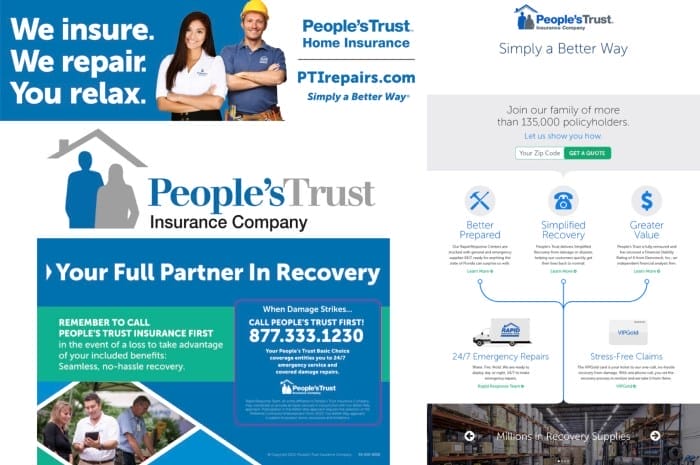In the realm of personal finance, selecting a trustworthy insurance company stands as a pivotal decision, safeguarding your assets and ensuring financial stability during unforeseen events. Embark on this journey with us as we delve into the intricacies of choosing an insurance provider, empowering you with the knowledge to make informed decisions.
Choosing the right insurance company is not a one-size-fits-all endeavor. Factors such as reputation, licensing, customer service, coverage options, and price play a crucial role in determining the suitability of an insurance provider. Join us as we unravel the intricacies of each aspect, providing you with the tools to navigate the insurance landscape with confidence.
Licensing and Accreditation

Verifying an insurance company’s licensing and accreditation is a crucial step in assessing its trustworthiness and ensuring it operates legally and ethically.
Licensing demonstrates that the company is authorized to conduct business in a particular state or jurisdiction. Accreditation, on the other hand, signifies that the company meets specific standards of financial stability, customer service, and ethical conduct.
Verifying an Insurance Company’s License
- Contact the State Insurance Department: Each state has an insurance department responsible for regulating insurance companies. Contact the department in the state where you reside or where the company is headquartered to inquire about the company’s license status.
- Check the Company’s Website: Many insurance companies display their license information on their website. Look for a section labeled “About Us” or “Licensing” to find this information.
- Review the National Association of Insurance Commissioners (NAIC) Database: The NAIC maintains a database of all licensed insurance companies in the United States. You can search the database by company name or state to verify a company’s license status.
Identifying Reputable Accreditation Organizations
- Accredited by the Better Business Bureau (BBB): The BBB is a non-profit organization that evaluates businesses based on their customer service, complaint handling, and ethical practices. Look for companies with an A+ rating from the BBB.
- Approved by the National Association of Insurance Commissioners (NAIC): The NAIC is a regulatory organization that sets standards for insurance companies. Companies accredited by the NAIC have met specific criteria for financial stability, claims handling, and customer service.
- Recognized by the AM Best Company: AM Best is a global credit rating agency that evaluates insurance companies’ financial strength and stability. Companies with a high AM Best rating are considered financially sound and reliable.
Customer Service
Assessing an insurance company’s customer service is vital for a smooth and positive experience. Here’s how to evaluate their responsiveness, helpfulness, and claims handling process:
Assessing Responsiveness and Helpfulness
- Prompt Response: Check if the insurance company offers multiple communication channels like phone, email, and online chat. Consider their average response time and whether they provide 24/7 support.
- Knowledgeable Representatives: Ensure the company’s representatives are knowledgeable about their products, policies, and procedures. They should be able to answer your queries clearly and promptly.
- Personalized Service: Look for companies that offer personalized service tailored to your specific needs and circumstances.
Evaluating Claims Handling Process
- Transparency: Verify if the company provides clear information about their claims process, including the steps involved, documentation required, and estimated processing time.
- Efficiency: Check the company’s track record in processing claims efficiently. Consider the average time taken to settle claims and the percentage of claims approved.
- Customer Reviews: Read customer reviews and feedback about the company’s claims handling process to gain insights into their experiences.
Coverage Options
Understanding the coverage options offered by an insurance company is crucial in selecting a trustworthy provider. Different companies may offer varying levels of coverage, and it’s essential to compare and choose the one that aligns with your individual needs and circumstances.
Research the various coverage options available, such as liability, property, medical, and other specialized coverages. Assess your potential risks and determine which areas require protection. Consider factors like your location, assets, and lifestyle when evaluating coverage options.
Comparing Coverage Options
To compare coverage options effectively, obtain quotes from multiple insurance companies. Carefully review each quote, paying attention to the specific terms, conditions, and exclusions. Consider the following aspects:
- Coverage Limits: Examine the maximum amount of coverage provided by each company for different types of claims.
- Deductibles: Compare the deductibles (the amount you pay before the insurance coverage kicks in) offered by different companies.
- Exclusions: Be aware of any exclusions or limitations in the coverage provided by each company.
- Policy Terms: Review the policy terms, including the duration of coverage, renewal conditions, and cancellation policies.
Choosing the Right Coverage
When selecting the right coverage, consider your individual needs and circumstances. Evaluate your assets, potential risks, and financial situation to determine the appropriate level of coverage. Consider the following factors:
- Personal Assets: Assess the value of your personal belongings and property to determine the necessary coverage limits.
- Lifestyle: Consider your lifestyle and activities to identify potential risks and coverage needs.
- Financial Situation: Evaluate your financial situation to determine the premium you can afford and the deductible you are comfortable with.
Choosing the right coverage ensures that you are adequately protected against potential risks and financial losses. Take the time to understand the coverage options, compare quotes, and select the insurance company that offers the best coverage for your needs.
Price and Value

When selecting an insurance company, considering the price and value of insurance policies is crucial. Evaluating the cost of coverage, benefits, and exclusions will help you find a policy that suits your needs and budget.
To compare insurance quotes accurately, ensure you’re comparing policies with similar coverage levels and limits. Read the policy documents carefully to understand what is and isn’t covered, as well as any deductibles or co-payments that may apply.
Evaluating Benefits and Drawbacks
When comparing insurance policies, consider the benefits and drawbacks of each option. Some policies may offer additional coverage or features that are important to you, while others may have lower premiums but fewer benefits. Weigh the pros and cons carefully to determine which policy provides the best value for your money.
Claims Process

Understanding an insurance company’s claims process is essential for ensuring a smooth and hassle-free experience in case of an incident or loss. Each insurance company has its own unique claims process, so it’s crucial to familiarize yourself with the specific procedures and requirements.Filing
a claim with an insurance company typically involves several steps. First, contact your insurance company as soon as possible after the incident or loss occurs. Be prepared to provide detailed information about the event, including the date, time, and location.
The insurance company may also request documentation, such as photographs, receipts, or police reports.Once the claim is filed, the insurance company will assign an adjuster to handle the case. The adjuster will review the claim and determine if it is covered under your policy.
If the claim is covered, the adjuster will work with you to determine the amount of your settlement.It’s important to keep track of the status of your claim and to communicate regularly with the adjuster. You can usually check the status of your claim online or by calling the insurance company.
If you have any questions or concerns, don’t hesitate to contact your adjuster.In case of any disputes or disagreements with the insurance company’s decision, you may have the option to file an appeal. The appeals process varies from company to company, so it’s important to understand the specific procedures for your insurance company.
Tips for Filing a Claim:
- Contact your insurance company as soon as possible after the incident or loss occurs.
- Be prepared to provide detailed information about the event, including the date, time, and location.
- Gather documentation, such as photographs, receipts, or police reports, to support your claim.
- Keep track of the status of your claim and communicate regularly with the adjuster.
- If you have any questions or concerns, don’t hesitate to contact your adjuster.
- If you disagree with the insurance company’s decision, you may have the option to file an appeal.
Exclusions and Limitations

Understanding exclusions and limitations in insurance policies is crucial for comprehensive coverage and avoiding unpleasant surprises.
Identifying Exclusions and Limitations
Insurance policies often contain specific exclusions, which are situations or circumstances not covered by the policy. Additionally, there might be limitations, which are restrictions on the amount or type of coverage provided. It’s essential to carefully review the policy to identify these exclusions and limitations.
Mitigating the Impact of Exclusions and Limitations
While exclusions and limitations are common in insurance policies, there are steps you can take to mitigate their impact:
- Choose the Right Policy: Opt for a policy that aligns with your needs and includes coverage for the risks you’re most concerned about.
- Review Endorsements and Riders: Endorsements and riders can be added to policies to expand coverage or modify exclusions. Consider these options to enhance your protection.
- Increase Coverage Limits: If possible, increase the coverage limits to ensure adequate protection in case of a covered loss.
- Purchase Additional Coverage: In some cases, you may need to purchase additional coverage to fill gaps in your policy’s protection.
Renewals and Cancellations

To avoid surprises and ensure a smooth experience, it’s crucial to understand the terms and conditions associated with policy renewals and cancellations.
Familiarize yourself with the renewal process, including the renewal date, any automatic renewal clauses, and the grace period for making premium payments. Understanding these terms will help you avoid lapses in coverage and potential penalties.
Avoiding Surprises
- Review Your Policy: Carefully read your policy document to understand the renewal and cancellation terms, including any fees, penalties, or restrictions.
- Set Reminders: Mark your calendar with renewal dates and deadlines to ensure timely payments and avoid policy lapses.
- Communicate with Your Insurer: If you have any questions or concerns regarding renewals or cancellations, contact your insurance provider directly. Clear communication can prevent misunderstandings and ensure a smooth process.
Negotiating Favorable Terms
- Maintain a Good Claims History: A history of responsible driving or a lack of claims can often lead to favorable terms during policy renewals. Consider implementing safe driving practices to maintain a clean record.
- Shop Around: Before renewing your policy, compare quotes from multiple insurance companies. This can help you find better coverage options at competitive rates.
- Consider Bundling Policies: If you have multiple insurance policies, such as auto and home insurance, bundling them with the same provider may result in cost savings and streamlined management.
Additional Considerations

When selecting an insurance company, it’s crucial to consider factors beyond financial stability and coverage options. These additional aspects can impact your overall experience and satisfaction with the insurer.
Evaluating Sustainability and Social Responsibility
In today’s world, many individuals seek insurance companies committed to sustainability and social responsibility. Here are tips for evaluating an insurer’s commitment to these principles:
-
-*Review the company’s sustainability report
Many insurance companies publish sustainability reports that Artikel their environmental, social, and governance (ESG) practices. These reports provide insights into the company’s efforts to reduce its carbon footprint, promote diversity and inclusion, and support local communities.
-*Look for certifications and awards
Some insurance companies have earned certifications or awards for their sustainability efforts. These recognitions can serve as indicators of the company’s commitment to responsible business practices.
-*Consider the company’s investments
The investments made by an insurance company can also reflect its commitment to sustainability. Some companies invest in renewable energy, green infrastructure, and other environmentally friendly projects.
Finding Specialized Products or Services
If you have unique insurance needs, it’s essential to find an insurance company that offers specialized products or services tailored to your specific requirements.
Here are some tips for finding such companies:
-
-*Research online
Many insurance companies have websites that provide detailed information about their products and services. You can use online search engines to find companies that offer specialized coverage options relevant to your needs.
-*Consult with an insurance broker
An insurance broker can help you compare policies from multiple insurance companies and find one that meets your specific requirements. Brokers have access to a wide range of insurance products and can provide expert advice on choosing the right policy for you.
-*Ask for recommendations
Friends, family members, or colleagues may have experience with insurance companies that offer specialized products or services. Their recommendations can be a valuable resource in your search.
Professional Advice

Selecting an insurance company can be challenging, given the complexities and variations in policies, terms, and conditions.
Seeking professional advice from an insurance agent or broker can provide valuable insights and assistance in making informed decisions.
Engaging a qualified insurance professional offers several benefits. They possess in-depth knowledge of the insurance industry, enabling them to analyze your specific needs, assess risks, and recommend suitable coverage options. Insurance professionals can navigate the intricacies of policies, explain terms and conditions, and provide personalized advice tailored to your unique circumstances.
Finding a Qualified Insurance Agent or Broker
To find a qualified insurance agent or broker, consider the following tips:
- Referrals and Recommendations: Ask friends, family, or colleagues for recommendations of reputable insurance professionals they have had positive experiences with.
- Online Research: Search online directories, review websites, and read customer reviews to gather information about insurance agents and brokers in your area.
- Professional Organizations: Look for insurance professionals who are members of reputable organizations such as the National Association of Insurance Commissioners (NAIC) or the Independent Insurance Agents & Brokers of America (IIABA).
- Experience and Qualifications: Consider the experience and qualifications of the insurance professional. Look for individuals who have been in the industry for several years and possess relevant certifications or designations.
- Personal Interaction: Schedule a meeting or phone call with the insurance professional to assess their communication skills, responsiveness, and ability to understand your needs.
Working with an Insurance Professional
Once you have selected an insurance professional, it is important to work closely with them to make informed decisions about your insurance coverage.
- Open Communication: Maintain open and honest communication with your insurance professional. Share your concerns, goals, and expectations clearly.
- Provide Accurate Information: Provide accurate and complete information about your assets, liabilities, and risk exposures to ensure that your insurance professional can make accurate recommendations.
- Ask Questions: Do not hesitate to ask questions about policies, terms, conditions, and coverage options. Clarify any doubts or uncertainties you may have.
- Compare Quotes: Obtain quotes from multiple insurance companies to compare coverage options, premiums, and deductibles. This will help you make an informed decision based on your specific needs and budget.
- Review Policies Thoroughly: Before finalizing your decision, carefully review the insurance policies to ensure that you understand the terms, conditions, and exclusions. Consult with your insurance professional if you have any questions or concerns.
Final Conclusion

As you embark on the journey of selecting an insurance company, remember that knowledge is your most potent weapon. Equip yourself with the insights provided in this guide, and you’ll be well on your way to choosing a trustworthy insurance provider.
While professional advice can be invaluable, your own research and understanding will empower you to make informed decisions, ensuring that your insurance needs are met with the utmost care and reliability.
Answers to Common Questions
What are some red flags to look for when evaluating an insurance company’s reputation?
Beware of companies with a history of complaints, poor customer service ratings, or questionable financial stability. Scrutinize online reviews, ratings from reputable sources, and financial reports to gain a comprehensive understanding of a company’s reputation.
How can I verify an insurance company’s licensing and accreditation?
Visit the insurance regulatory authority’s website in your state or country to confirm the company’s license status. Additionally, check for accreditations from reputable organizations like the Better Business Bureau (BBB) or the National Association of Insurance Commissioners (NAIC).
What should I consider when assessing an insurance company’s customer service?
Look for companies with responsive and helpful customer service representatives. Check online reviews and forums to gauge the experiences of other customers. Consider the availability of multiple communication channels, such as phone, email, and online chat, to ensure ease of access when you need assistance.
How do I compare coverage options from different insurance companies?
Carefully review the terms and conditions of each policy, paying attention to the coverage limits, deductibles, and exclusions. Consider your specific needs and circumstances to determine the most suitable coverage for your situation.
What are some tips for filing a claim with an insurance company?
Contact your insurance company promptly to initiate the claims process. Provide detailed information about the incident and any relevant documentation. Keep a record of all communications with the insurance company and track the status of your claim regularly. If you encounter any disputes, consider seeking professional advice from an insurance attorney.



